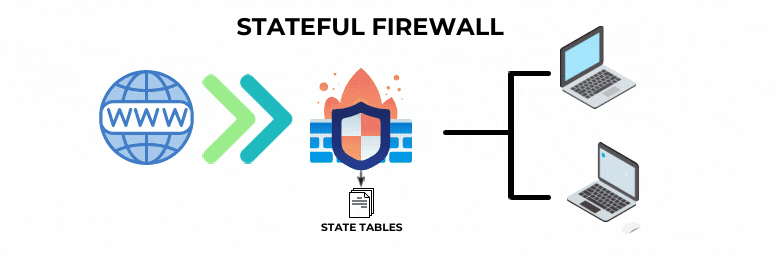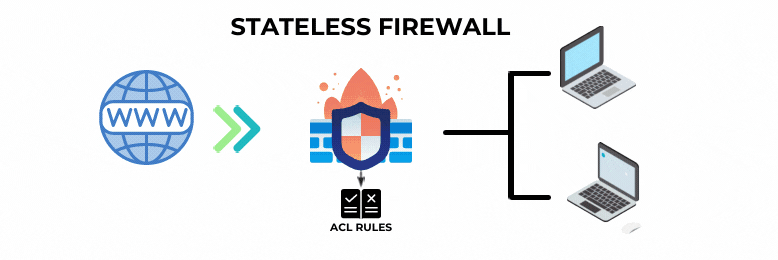Stateful vs. Stateless Firewall: What You Need to Know
October 5th, 2021 | 4 min. read
Thanks to firewalls, our networks are now protected against the threat of data theft and cyberattacks. There are two common firewall types: stateful and stateless. Is one better than the other? Find out by reading this article.
Given the complexity of today’s heterogeneous digital environments, it has become a necessity for organizations to beef up their security. This has become even more important as cyber-attacks show no signs of slowing down.
According to recent data, cybercrime has increased by 600% during the Covid-19 pandemic. In recent months, we’ve also seen managed service providers hit by ransomware attacks. It is undoubtedly a critical time to shore up one’s defenses against attacks more than ever.

Firewalls offer a line of defense against such devastating attacks. They protect the network from cyber threats by regulating your network traffic. It does so by blocking incoming network traffic that doesn’t fall within its safety parameters.
At Intelligent Technical Solutions, firewalls are a big part of our cybersecurity strategy. As a managed service provider, we ensure to bring our customers up to our standards by encouraging them to install a SonicWall next-generation firewall on their networks.
In this article, we’ll discuss what firewalls are and its two types: stateful and stateless firewalls. We hope that you’ll better understand how a firewall works by the end of this article and which kind is better for your organization.
How Do Firewalls Work to Protect Against Threats?
Firewalls are indispensable when it comes to protecting networks from persistent threats. They are responsible for stamping out a vast majority of threats coming into contact with digital environments. Though they are not a complete cybersecurity solution, every organization must have one.

A firewall can come in the form of hardware, software, or both. It creates a barrier or filter between secured and controlled internal network environments and untrusted external networks, such as the internet.
Specifically, firewalls prevent unauthorized access to a network by inspecting incoming traffic and blocking it based on established rulesets. The rulesets describe how the firewall should act and determine what traffic and content should be permitted to pass through network perimeters.
Rulesets should be as specific as possible regarding the type of traffic they control and should include the protocol needed for management. They can be optimized depending on the applications and environment.
Your operating system and security software typically have a pre-installed firewall. Always check if these features are enabled, and ensure that your settings are correctly configured to install new updates automatically.
What Is a Stateful Firewall?

Not all firewalls are the same, and various types of firewalls exist to suit a company’s needs. Typically, firewalls fall within the category of network firewalls, which are positioned in front of the network hardware or perimeter, or host-based firewalls, an application or software installed on host computers to monitor traffic. There are also what’s called stateful or stateless firewalls, which is what this article is about.
A stateful firewall is capable of tracking the state of active network connections in its entirety. It continuously evaluates traffic and data packets that are attempting to cross the network. Once approved, the traffic request will be added to an approved list, allowing it to proceed to the network. Traffic and data packets that don’t fulfill the required handshake are denied entry.
A stateful firewall is also known as a dynamic packet filter as it regulates data packets based on their context and state. The context involves the metadata of the packets, the ports and IP address of the endpoint and destination, and more. State, meanwhile, refers to the policy based on the connection state.
What Is a Stateless Firewall?

On the other hand, a stateless firewall checks static information such as the source and the destination address to validate threats. If a traffic request seems abnormal or does not match based on existing preset rules, the firewall blocks it.
Stateless firewalls differ from stateful firewalls because they filter data packets based on the content of the packets themselves rather than looking into the entire context of a network connection.
This means that stateless firewalls do not inspect the entire traffic, and therefore cannot determine what type of traffic is involved. It won’t be able to distinguish between different traffic types.
Stateless firewalls cannot determine the complete pattern of incoming data packets. Instead, it inspects packets as an isolated entity.
What’s good about stateless firewalls is that it performs better than stateful firewalls during heavy network traffic. It is also faster and cheaper than stateful firewalls.
Stateful vs. Stateless Firewall: Which Is Better?
Considering the individual needs of organizations helps in deciding which firewall is more suitable for them.
Small businesses, for instance, can benefit from the significant cost reduction that a stateless firewall may bring. A stateless firewall may also be fit for them, as their traffic loads are lower than enterprises. This could mean that incoming threats are fewer for them.
Since companies deal with a lot of sensitive data, they should be protected against all manner of cyberattacks. They also deal with heavy incoming and outgoing traffic that needs to be monitored at all times.
For this reason, they could benefit more from using a stateful firewall rather than a stateless one. A stateful firewall has better security features that can mitigate attacks than a stateless firewall. Apart from continuous traffic monitoring, stateful firewalls also have sophisticated memory and logging capabilities that better detect threats.
Let Your MSP Help You in Choosing the Right Firewall for You

There are different types of firewalls based on an organization’s environment and evolving requirements. Choosing one over the other certainly comes with its own sets of advantages and disadvantages, depending on what your company needs at this point.
As discussed, a stateless firewall can work for smaller companies, while stateful firewalls may be a necessity for larger corporations.
When selecting firewalls from a sea of options, it helps to involve your managed service provider. Your MSP can provide you with expert advice on what type of firewall and firewall configuration best suits your needs.
Here at ITS, we see to it that our clients are choosing the right technologies for their complex and ever-changing requirements. Contact us today to take advantage of our free network assessment so you can ensure that your network assets are well-protected from cyber threats.
Alessandra Descalso is an in-house content writer for Intelligent Technical Solutions. As a former journalist, her works have seen the pages of both local and international publications. She also has over a decade of experience in content writing, creating website copies, articles, and blogs for businesses and digital marketing teams from across the globe. She previously ran the financial news and PR teams at an advertising SaaS provider and recently served as a senior technology content writer at a digital marketing firm.
Topics:
